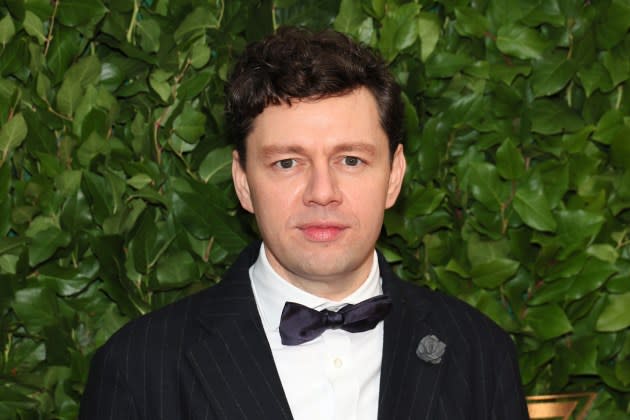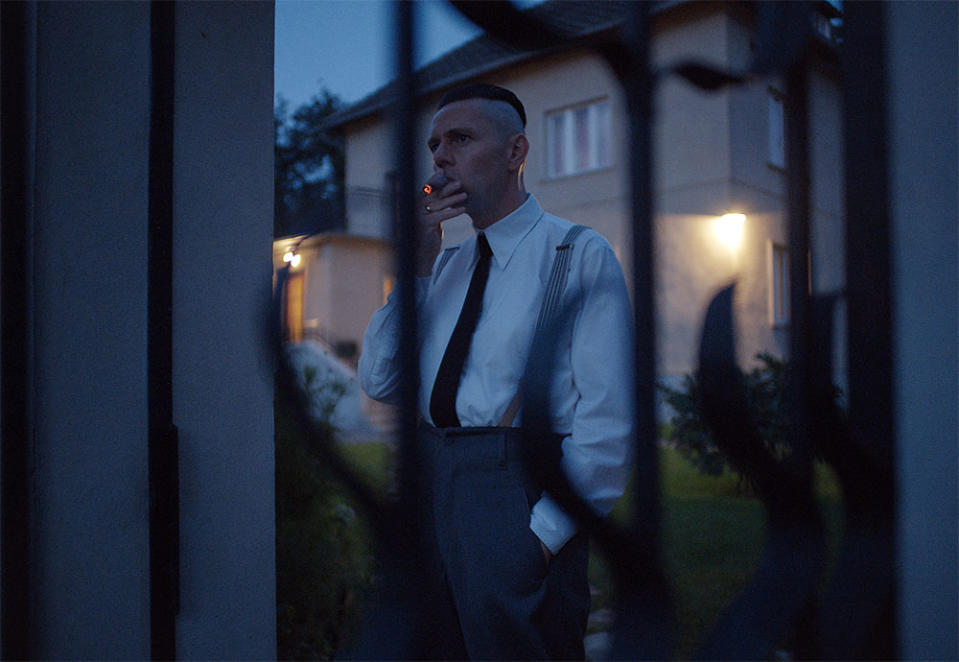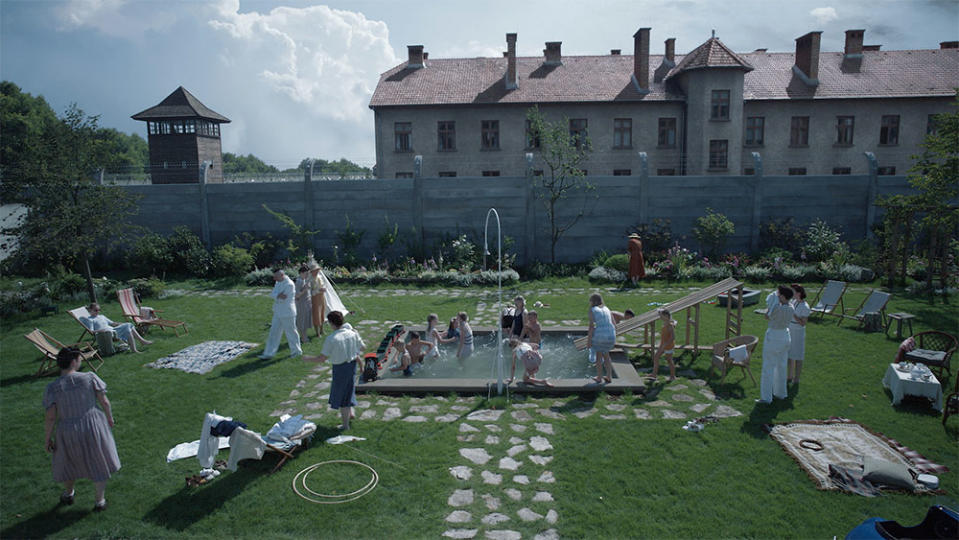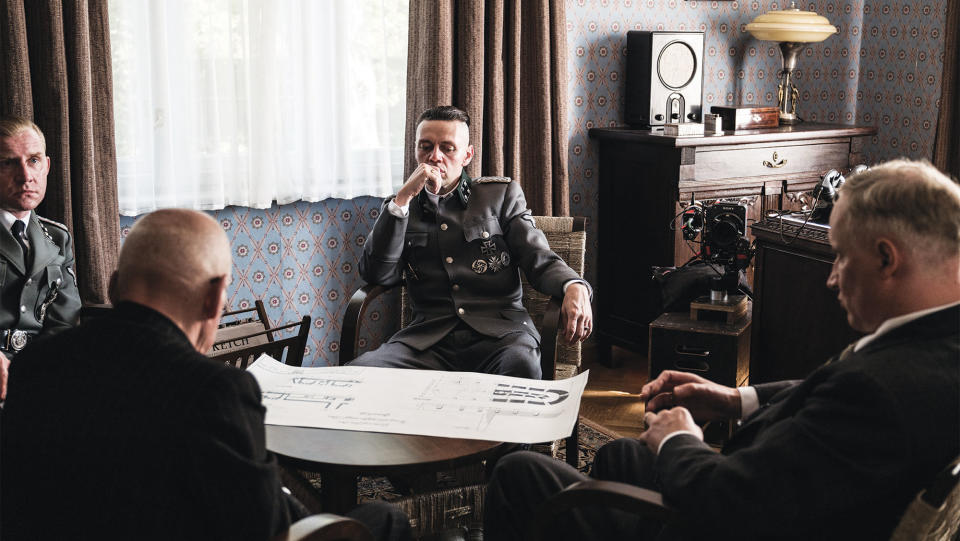Christian Friedel on ‘The Zone of Interest’: Finding Humanity Amid the Horror

Few actors have embodied the full range of modern German history on screen as has Christian Friedel.
In Jonathan Glazer’s Holocaust drama The Zone of Interest — a dark horse candidate for the best picture Oscar this Sunday (where it is also nominated in four other categories, including best international feature), Friedel plays Rudolf Höss, the notorious commandant of Auschwitz who, together with his wife Hedwig (played by Sandra Hüller), built an idyllic villa with a pretty garden for their five children right next to the death camp.
More from The Hollywood Reporter
Messi the Dog, 'Anatomy of a Fall' Star and New Hollywood Darling, Expected to Miss Oscars
Paul Giamatti Would Rather Talk About Bigfoot and UFOs Than Pretty Much Anything Else
Why Netflix Is Getting Into the Ring With Mike Tyson and Jake Paul
But before Zone, the 45-year-old German actor was best known for playing famed anti-Nazi resistance fighter Georg Elser in 13 Minutes, Oliver Hirschbiegel’s 2015 drama about Elsner’s attempt to assassinate Adolf Hitler in 1939, before World War II and before the Holocaust. In 2012’s Closed Season, Friedel plays a young Jewish refugee hiding from the Nazis. And in his film debut, in Michael Haneke’s The White Ribbon (2009), set before World War I, he plays a young piano teacher, part of a generation that, the audience knows, will grow up to be the perpetrators of National Socialism.
“There’s that connection, between The White Ribbon and The Zone of Interest,” says Friedel, “because the kids in Ribbon could be the killers in Zone.”
Born in Magdeburg, Friedel grew up, like his Zone co-star Hüller, in former East Germany and, like Hüller, cut his acting teeth in German theater and both still perform on stage. Friedel’s theater roles tend to the classics, Shakespeare in particular. He recently celebrated the 150th performance of Hamlet, in which he depicts the doomed Danish prince as an art-rock popstar, with music provided by Friedel’s own Shakespeare-inspired band, Woods of Birnam.
But on screen, Friedel’s career, he says, has taken him to “the most extreme poles” of German history, “from resistance fighter to escaped Jew to Nazi murderer [but] in every case, I try to shine a light on these different people and to find the humanity inside them. Even with Rudolf Höss.”
Friedel’s performance as Höss is the dark heart of Zone of Interest. Avoiding both sentimentality and the understandable urge to depict Höss as an “evil monster,” his take invites identification with the Nazi commandant without ever allowing us to empathize with him. It underscores Glazer’s approach with Zone, which encourages the audience to see the similarities not between themselves and the victims of Nazis but with the perpetrators, who diligently ignore the horrors being committed in their name taking place just out of view.
In a wide-ranging conversation with The Hollywood Reporter, Friedel discusses playing Höss as a “boring bureaucrat,” why he twice turned down the role of Adolf Hitler, and why, after all those serious roles, he’d really like to try a comedy: “People tell me I’m actually quite funny.”
How did you become an actor, was there an artistic background in your family?
My father was a doctor and my mother was an economist working for a factory but from the start, I’d say from birth, I was an entertainer. I used hand puppets, do little plays in kindergarten. At school at recess, I get up on a bench and sing for the other kids. Basically, that’s what I still do.
My mother knew I had to go to the theater so when I was in Grade 2 she took me to the state theater in Magdeburg and got me signed up as an extra. After school, I’d got straight to the theater, and I did everything, playing extras in operas, ballet, whatever. At the same time, I was making music with my best friend. So those were always two parallel paths in my life, music and acting. After the fall of the Berlin Wall, when these electronic keyboards came on the market, I’d get a new keyboard every Christmas and I taught myself to play. I can’t manage a full piano concerto, but it’s good enough for my pop music.
My ideal situation is when I can combine acting and music. So right now I’m preparing a film with a friend, Markus Schleinzer, who is directing Sandra [Hüller] in her next film Rose. Our movie is about Klaus Nomi, the German countertenor that became a cult figure in 1980s New York and died, far too soon, as one of the first victims of AIDS. Me and my band will do the music, and maybe write some of our own songs. I’m going to try and sing Nomi’s songs myself.
Isn’t that how you got your first film role, in Michael Haneke’s The White Ribbon, because you knew how to play the piano?
I always wanted to do movies. As a kid, I had the same routine. Sunday at 9 a.m., I’d go to the movies and after the film, at 11 a.m., we’d go to the ice cream parlor and reenact the film. I always dreamed of being part of this world. But it was a long time before I was able to shoot my first film. With The White Ribbon, they were looking for a young man who could also play piano. I told them I could play classical music, although I couldn’t. I had to learn all those Bach and Schumann pieces I play in the film, but it was my way in.
At the time, Haneke told me he had a lot of trouble casting the film because he wanted to have actors who looked as if they belonged in the time period, sort of the opposite of people who have faces that have seen an iPhone.
Haneke said to me, “You have a historical face.” Maybe that’s why I get cast in so many historical movies. But it’s great, I love to jump in that time machine. Of course, you have to be careful not to get stuck in one period, like with World War II, which I’ve done a lot, both with roles in Zone and 13 Minutes and [TV series] Babylon Berlin, which is the same period again. It seems there is something about the way I look that makes people feel I could have lived way back then, it seems to fit. But I’m also interested in doing modern-day films — or sci-fi!
Did you have any trepidation about playing Rudolf Höss, the commandant of Auschwitz, for The Zone of Interest?
I was careful. I’ve been offered [to play] Adolf Hitler twice and [Nazi leader] Rudolf Hess once, and I turned them down because they were clichéd portrayals, and that didn’t interest me. But as soon as I met Jonathan [Glazer] I was convinced of his vision, of his approach, to show [Rudolf Höss] as a boring bureaucrat in everyday situations, to give this monstrous person a human face. That interested me. And, of course, the chance to work with Jonathan. I grew up with his work without knowing it, as a Radiohead and Massive Attack fan, with his videos, or watching his ad for Levis in the cinema where a man and woman run through walls in space. Later I realized that was all Jonathan. Then I realized, I’d do anything for him. Even play a Nazi.
I was even offered Adolf Eichmann for a film version of the Wannsee Conference, but it was around the same period as we were doing Zone of Interest and I thought, one Nazi is enough! But whether it’s playing Höss or playing Elsner or playing a Jewish refugee like I did in Closed Season, the challenge is always the same: How do I transform myself to play the human behind the character and not the cliché?

How did you find the human core beneath Rudolf Höss’ monstrous surface?
For me, it came from the discussions I had with Sandra and with Jonathan. It was clear to me if I was going to play Rudolf, I’d have to find a way to recognize myself in the role. In small aspects of his behavior. In this scene, he is a loving father, or in this scene, he’s a passionate rider or here he’s a good manager, or whatever it was. I tried to break down the individual scenes to find emotional connections. We aren’t glorifying this figure and we aren’t emotionalizing him too much but there are moments, like when Rudolf says goodbye to his horse, and we see a real sense of sadness. Or when he talks to his wife, and we notice the sense of trust that exists between them. Or when he senses the power he has within this system and he’s clearly enjoying it. The challenge was to find those moments, to think about where they come from and to try and find a connection with my own personality.
It was a difficult search, but I thought I needed to do that so that we didn’t show him as just the monster, just the criminal.
Did you do much research for the role?
For me, it was mainly a technical process to prepare. I had to lose weight for the summer scenes, then gain it for the winter one. Then for the reshoots, I had to lose it again and gain it again. My body was a bit out of control. I had to learn how to ride because I’d never been on a horse before and Rudolf was a very good rider. I had a year and a half of training with a great stuntman.
I read a bit of Höss’ biography, and I listened to his voice online from the Nuremberg trials, but there you hear the voice of a prisoner and not the voice of a commandant in his glory days. I also read newspapers from the time.
But because we weren’t doing a biopic, but were trying to connect the characters to ourselves, and give our own, very particular interpretation of this family, the main details were technical and specific. It was the kind of clothes they wore, the hairstyles, and details from eyewitness reports from the time. Building the character came mostly from the talks I had with Sandra and Jonathan.
Then there was the shoot itself and Jonathan’s approach, using multiple cameras, this “Big Brother in a Nazi house” style, meant it was good to not be too prepared. Because the style allowed us to have the freedom to improvise, to make mistakes or try variations on set and not be bound by some big pre-arranged plan.
What sort of direction did Jonathan give you on set?
We spoke about the scenes, but Jonathan never told us how to do them. We did technical blocking the day before each shoot, noting which rooms we be shooting in for example, and then on the day we started shooting without any rehearsals. After each take, someone would yell ‘Cut!’ Or sometimes, nobody would yell cut and we’d just stay in the room and keep acting. We could start over or keep improvising and we’d often improvise.
There’s the scene where the family has dinner and Rudolf tells them he’s being transferred to Berlin. It was written with him giving a speech first and then eating dinner. I did that and had the choice to do it again, which I did then did a variation with doing the speech after the dinner and others. It was an almost documentary approach. Because there was no crew on set, you could move where you wanted; we had incredible freedom. For the kids it was great, because they forgot the cameras and that it was a film: Sometimes we do takes of one and a half hours without a break.
In the scene with the garden party outside, the kids were playing, eating cookies, and drinking lemonade and it was just Sandra and I going over our scene again and again, as if on a loop. After three and a half hours, the kids forgot about the movie and were just having a party.
When we had a short scene, Jonathan sometimes would come on set and challenge us to improvise and give a different interpretation, the normal sort of thing a director would tell you. But every day was different.

Did Jonathan tell you to tone down the emotionality of your performance to keep Höss’ monster hidden?
Absolutely. He often would tell me when, in more emotional scenes, my figure was getting too aggressive, where you could see the murderer inside Höss. Jonathan left those out. Because it was more powerful in the scenes where you could feel it but it was hidden, which is the whole concept of the film.
Whenever my performance became too obvious, Jonathan would notice. Even though he doesn’t understand German, he always noticed when my performance was too much. He’d say to me: ‘You have tension in your body, like a drawn bow, but you can never let it fly. We can’t ever see Rudolf’s aggression, see him as the perpetrator, the murderer, but we always have to sense it.’
It wasn’t a typical film set, but it sounds like it wasn’t like theater either, because you didn’t have an audience. Was it like anything you’d done before?
No, I’d never experienced anything like it. And it was incredible. Because there were no continuity issues. Working as a film actor you can end up in these situations where the director says: ‘the glass was 2 cm to the right and you have to drink after sentence two and laugh after sentence four.’ There was none of that. You didn’t have to worry about angles or if you turned left or right. We could all move freely.
It was fantastic not to see the team. Jonathan was in a trailer outside, the focus pullers were in the basement. At times it was eerie in the house, especially at night, but that was helpful too. You had the feeling you had all the time in the world. For me, it was a complete luxury but it was also a situation that challenged me because you couldn’t hide.
It also meant we were completely focused. There was none of the: now the camera is on Sandra, so Christian can relax, or the reverse, although both of us. We are all in the same boat we had to stay focused and it led to a specific feeling on set that can be incredibly difficult to capture. But because of Jonathan’s way of shooting, it was there from the start.
How did being on location in Auschwitz impact your performance or your mindset during the shoot?
It was very intense. We could visit the museum and the camp during the shoot or afterward. I decided to visit the museum before we started shooting. Also so I could look at where Rudolf worked. The guide knew about the film project and told us things she doesn’t usually talk about on the regular tours, also about the Höss family, and I already had Rudolf’s hair cut and I was so ashamed and so embarrassed, I put on a hat despite it being really hot. It truly shocked me, the dimensions of the camp. I carried that with me the entire time — the size of the event, the shame, the responsibility towards the victims, the historical context of being there as a German. That was there all the time.
We did one scene in the Höss house, in the tunnels where Rudolf washes himself. That was the original house, because there was a tunnel system where he could travel, unsee, between his house and the office, and where it has been documented, he used for affairs. And to stare out from the children’s bedroom onto the gas chambers was extremely intense.
But I also have to admit, when I had a day off and I’d go to a cafe in the lovely town square, and just write some emails or read something, I’d catch myself forgetting where I was. That surprised me but it made me realize how easy it is to just forget, even there, in Auschwitz, where you know exactly what happened. How close you are to the killing camps, and how easy it is to forget.

From Georg Elsner in 13 Minutes to Rudolf Höss in The Zone of Interest, you’ve really covered the full range of recent German history.
It started with The White Ribbon. There’s actually a connection between The White Ribbon and Zone of Interest because the children in The White Ribbon could be the killers in Zone. After The White Ribbon I played an escaped Jew in Closed Season and then Elsner who, as one of the very first, fought this system and couldn’t believe that people were closing their eyes to what was happening. I found that very emotional and intensive work.
Through 13 Minutes, The White Ribbon, and Zone of Interest, the work has been a great inspiration for me, and not just as an actor. It’s not just been the opportunity to work with visionaries like Michael Haneke and Jonathan Glazer, but it’s helped me grow as a person.
I hope I’ve been able to shine a light on these different poles of German history and to find, within each of these people, their humanity.
With Höss, I think he was susceptible, primed for this fascist, Nazi ideology but he had certain talents and I often wondered what would have happened to him in a different system. But he chose this system, he followed it and he enjoyed the power it brought him. You can see that in the photos of him. You see a very self-satisfied person enjoying his power. Georg Elsner, in contrast, was someone who truly wanted to change the world. It wasn’t about him, it was about everyone else.
What has been great in my career is that people often don’t recognize me or don’t connect me to the other roles I’ve done. I think that’s great, because I always see myself as a single color in a great work of art. I like to take a step back and open myself to a director’s vision and see what I can learn and develop as an actor. With this role in Zone I really had to face my own fears, but I’m so grateful for the experience.
One thing you haven’t done much of is comedy…
Yes, even though people tell me I’m actually quite funny! My mother, when she was still alive, wished that I would do a comedy. I think I’d work well in comedy. The problem is, there just aren’t many good comedies in Germany. There are a huge number of great comedians and comic actors here, but so far I haven’t found a comedy where I think I could fit.
Maybe more East Germans should write comedies. It’s the one thing I’ve noticed, the difference between the West and East is the sense of humor. East Germans tend to be more ironic and subtler in their humor.
Definitely! East Germans can really laugh at ourselves. I think that’s important. Especially for us “artists” that’s something to remember. Not to take yourself too seriously.
Best of The Hollywood Reporter

